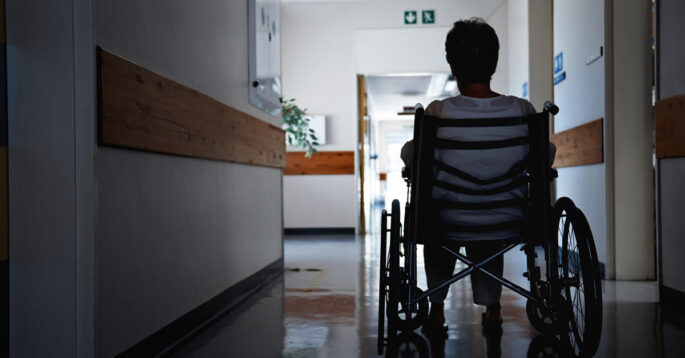Fewer than 1 in 5 nursing homes in the U.S. are meeting the latest government staffing requirements, according to a new study by the Kaiser Family Foundation (KFF).
This alarming statistic raises serious concerns about the potential for increased nursing home abuse and neglect due to understaffing.
Learn more about how the 2024 nursing home staffing ratios could impact the safety of your loved one.
Nursing Home Staffing Requirements by State 2024: Percentage of Facilities Meeting New Standards
KFF’s recent analysis reveals a troubling reality for nursing home residents across the United States. In 45 states, fewer than half of facilities meet the 2024 nursing home staffing mandate.
“The system is so broken and so short-handed … you’re not able to provide the care for the people that really need it at the moments they really need it.”
—Bonnie Gaudreau, Licensed Practical Nurse with 34 years in nursing homes
See how your state measures up in meeting the new nursing home staffing requirements and whether your loved one could be at risk.
| Homes Meeting New Staffing Mandates | States |
|---|---|
| 75% or more | AK, ND |
| 50-74% | HI, OR |
| 25-49% | AL, IA, ID, KS, MI, MN, MT, NE, NH, NV, RI, SD, UT, VT, WA, WI, WY |
| Less than 25% | AR, AZ, CA, CO, CT, DC, DE, FL, GA, IL, IN, KY, LA, MA, MD, MO, MS, NC, NJ, NM, NY, OH, OK, PA, SC, TN, TX, VA, WV |
| Source: KFF Analysis of Nursing Home Compare, April 2024 | |
A facility’s location significantly impacts the challenges it faces. Rural nursing homes have fewer workers, while urban ones face job competition. Still, both struggle to meet staffing standards, with only about 20% in compliance.
Alarmingly, only 11% of for-profit facilities are meeting these new standards, raising serious concerns about the potential for increased nursing home neglect and abuse.
If your loved one was harmed in a nursing home, we may be able to help.
The Nursing Home Abuse Center partners with top lawyers who have recovered over $304 million for families affected by abuse and neglect in nursing facilities.
Get a free case review right now to find out if we can help your family, too.
What Are the Nursing Home Staff Requirements?
The new federal staffing ratios for nursing homes require each resident to get over 3 hours of care each day.
A portion of that time must come from registered nurses and certified nursing assistants (CNAs), according to guidelines released in April 2024 by the Centers for Medicare & Medicaid Services (CMS).
The new federal rule mandates that nursing facilities must ensure:
- 3.48 hours of care per resident per day
- 24/7 on-site registered nurse (RN) coverage
- 2.45 hours of care from CNAs per resident per day
- 33 minutes of care from RNs per resident per day
These rules aim to improve care in nursing homes, which have long been criticized for understaffing and poor patient care.
Facilities in areas with severe worker shortages can apply for exemptions, but the main goal is to ensure residents get the care they need.
Risks of Understaffed Nursing Homes
Understaffed nursing homes pose significant risks to the safety and well-being of residents. Insufficient staffing can lead to inadequate supervision, delayed response times, and neglect of essential care needs.
Residents in understaffed facilities are more likely to experience:
Since nursing home residents are usually already frail, these situations can have serious or even fatal consequences.
Overworked staff often experience stress and burnout, leading to more quitting and worsening of the staffing problem.
This results in even fewer staff members, which lowers the quality of care and increases the risk of mistakes, neglect, and abuse.
Signs of Nursing Home Abuse and Neglect
Recognizing the signs of nursing home abuse and neglect is crucial for the safety of your loved ones.
Common signs of nursing home neglect and abuse include:
- Emotional withdrawal: If your loved one becomes unusually quiet, depressed, or anxious, it may be a sign of emotional abuse or neglect.
- Poor hygiene: Dirty clothing, unkempt appearance, or a foul smell may indicate that basic hygiene needs are unmet.
- Pressure ulcers: Bedsores commonly result from prolonged periods without movement, often due to inadequate staffing and care.
- Sudden weight loss: Significant drops in weight can be a sign of malnutrition, often due to neglect.
- Unexplained injuries: Bruises, cuts, or broken bones that seem to occur without a clear explanation are often an indicator of abuse.
If you are concerned about the care your loved one is receiving, we may be able to help you take legal action.
Call a member of our team right now at (855) 264-6310 or Click to Live Chat.
What to Do If You Suspect Your Loved One Is at Risk
If you suspect that your loved one is at risk of abuse or neglect in a nursing home, it is essential to take quick action. If your loved one is in immediate danger, always call 911.
Here are 5 steps you can take if you suspect nursing home abuse:
- Document your concerns: Keep a detailed record of any signs or incidents that raise concerns, including dates, times, and specific observations.
- Speak to the staff: Address your concerns with the nursing home staff and management. Sometimes, issues can be resolved quickly once they are flagged.
- Report the issue: If your concerns are not addressed or you believe the situation is serious, report the issue to your state’s long-term care ombudsman.
- Seek medical attention: Ensure that your loved one receives necessary medical care, especially if they have suffered an injury or health issue due to neglect.
- Remove your loved one if necessary: In cases of severe neglect or abuse, you may want to relocate your loved one to a safer facility.
Once your loved one is safe, consider working with a nursing home abuse lawyer to help you understand your legal options.
You may be able to seek money for care and recovery while also holding negligent facilities accountable.
Get Legal Help for Nursing Home Abuse
When nursing homes don’t meet federal staffing requirements, the residents suffer. If your loved one has been neglected or abused in an understaffed facility, reaching out to a nursing home lawyer is an important step toward justice.
An experienced attorney can guide you through the legal process, protect your loved one’s rights, and hold those responsible accountable.
By taking legal action, you not only seek compensation for your loved one’s suffering but also push for more aggressive nursing home minimum staffing requirements to ensure better care for all residents.
Get a free case review right now. We may be able to help secure the compensation and justice your family deserves.




